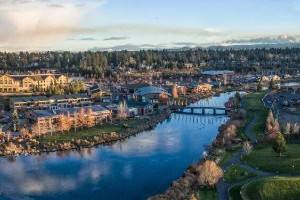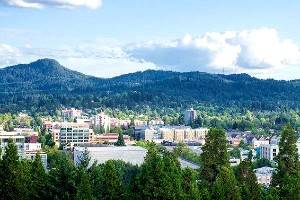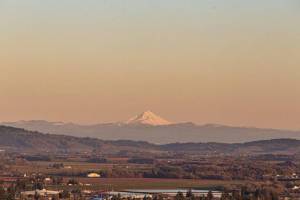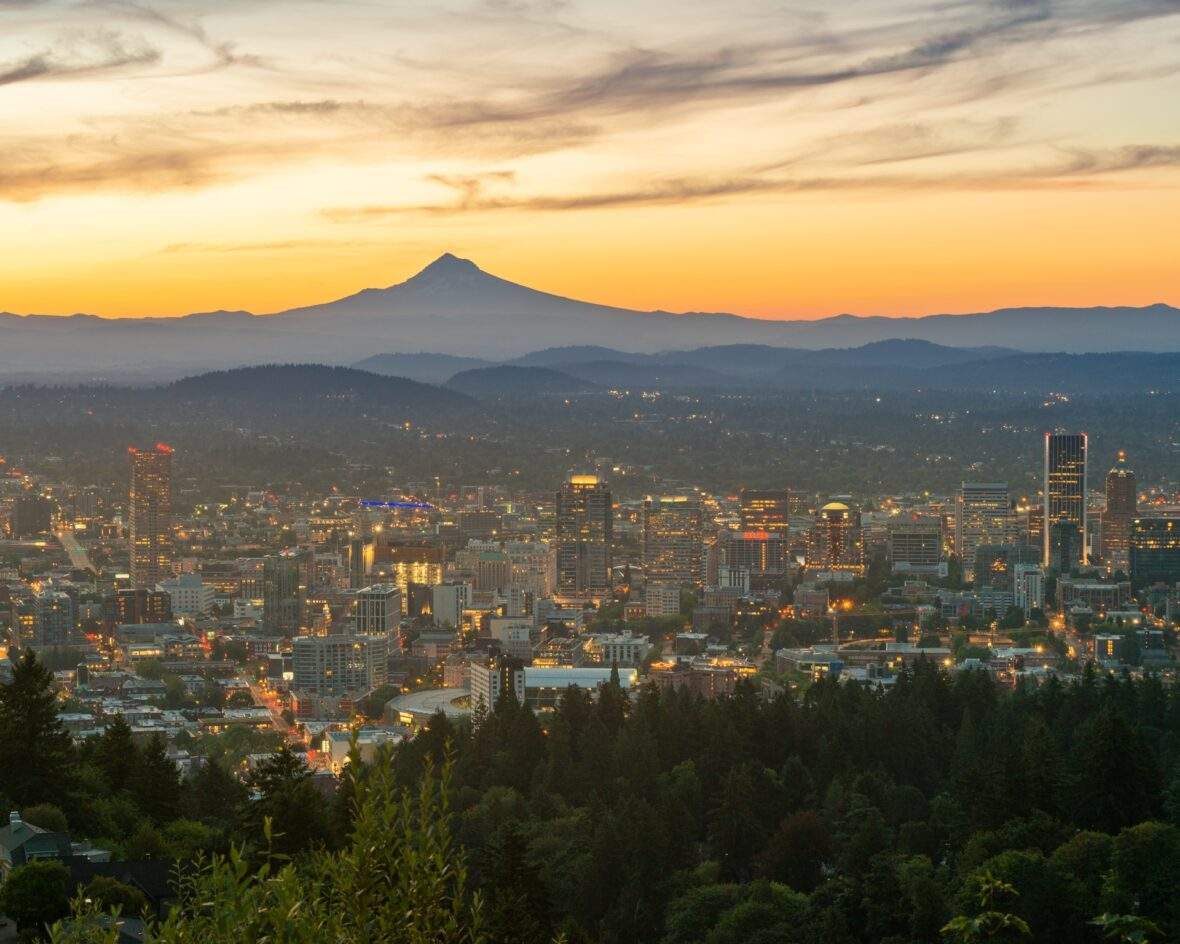Last Updated January 3, 2024
Oregon is a big place, but if you’re looking to move to a city, there are only a few options.
As you probably know already, Portland is the biggest. As of 2023, 608,000 people live inside its city limits. Other than that, cities with more than 150,000 people include only Salem (183,600 people) and Eugene (175,980).
Heck, Salem is close enough to Portland that some people consider it a distant suburb. So, let’s talk about Portland and Eugene.
If you’re planning to move to Oregon – or if you live in either Portland or Eugene and are considering a move from one to the other – which city is the better place to live?
That depends on what you – and your loved ones – want and need in a city. It also depends on your budget.
Let’s get into the nitty-gritty of living in Portland vs. Eugene. We’ll start from the more abstract angle of what the “vibe” is like in both Portland and Eugene then get more concrete about what each city does and doesn’t offer.
Portland vs. Eugene: Defining the Portland Vibe
Portland and Eugene are both unique. People don’t usually come here looking for a cookie-cutter, Anytown USA kind of experience. At the same time, there’s a lot more to both communities than the usual stereotypes might suggest.
If you’ve seen or heard of the show Portlandia, then you’re already familiar with the popular image of Portland. Portlandia portrays the city as a place “young people go to retire,” where off-puttingly quirky is the norm and everything from beer and ice cream to dog shampoo is as artisanal and precious as it gets.
These images are exaggerations. Portland is an appealing relocation destination for millennials, but a big reason is that there are actually plenty of jobs for young professionals. So much for early retirement.
And while “Keep Portland Weird” is the city’s unofficial slogan, it’s more about the culture than what you’re likely to experience on a day-to-day basis. As an analogy, Munich is known for Oktoberfest but its residents don’t all walk around wearing lederhosen all the time. You can seek out the “weird Portland,” but at least some of it is just for the tourists.
A more accurate way to describe Portland is that it’s progressive but not stuffy, and alternative but down-to-earth. It’s just a bit (or more than just a bit) out-of-step with the rhythms of both the American mainstream and the other, more polished urban centers of the West Coast.
More than anything else, Portland is a place where you can find your niche and thrive. People are working, raising families, and just living their lives while at the same time striving to make a difference and discover new facets of themselves.
Portland is also an active place. People place a high priority on getting outside, whether that means biking down to the park, driving to the coast, or backpacking around Mount Hood.
Even if none of the above sounds appealing, there are plenty of reasons to consider moving to Portland. For the past several decades, it’s been a regular on lists of the most livable cities in the U.S.
Before we move on to Eugene, there’s an elephant in the room we need to address. Lately, a more sinister image of Portland has emerged in the national media, portraying the city as an all-out battle zone between those on the far right and far left.
Unsurprisingly, the reality is far less dramatic. While protests have sometimes drawn decent-sized crowds, media attention has given the wrong impression as to how much it’s impacted Portlanders’ day-to-day lives.

Portland vs. Eugene: The Eugene Vibe in a Nutshell
At first glance, Eugene might seem a bit like a miniature version of Portland. Both cities are known for being quirky and eclectic, and they both offer great access to the outdoors, with fantastic city parks and green spaces and plenty of walkable and bikeable neighborhoods.
There are important differences, though. One side of Eugene remains connected to its circa-1960s identity as a mecca of the counterculture. The annual Oregon Country Fair is a must-visit if you want insight into that facet of Eugene, though a visit to Eugene’s weekly Saturday Market might suffice. Still, the city’s hippie pedigree has become less and less visible over the years.
That doesn’t mean Eugene has become totally normal – far from it. But it’s also difficult to pigeonhole.
Eugene definitely has the same progressive reputation as Portland. At the same time, parts of town are relatively conservative and more connected to the mainstream of American culture. The Cal Young, Harlow, and Churchill neighborhoods might be good picks if the alternative and quirky side of Eugene doesn’t appeal.
Eugene is also a college town. It’s home to the University of Oregon, the state’s top-ranked public university, drawing students and academics from all over the world.
The “college” vibe is strong here, but Eugene is big enough that it isn’t overpowering unless you’re in the square mile or so around campus. Part of the city’s collegiate identity means an emphasis upon student athletics. You might love that side of Eugene (many of the Oregon Ducks’ athletic programs are top-notch) or you might be totally indifferent to it. At our office, we have folks who fall into both categories.
But Eugene’s status as a college town also means a welcome influx of energy and talent. The UO has renowned performing arts programs (our own Kip Lohr is a proud graduate of the music school) and high-ranking journalism, law, and business schools.
All-in-all, Eugene feels smaller than Portland, which isn’t too surprising. On the plus side, there’s perhaps a stronger and more cohesive sense of community. On the minus side, though, Eugene is a significantly less diverse place than Portland.
There are opportunities in both cities for finding your niche and connecting to others who are like-minded. But at the end of the day, Eugene might feel somewhat more confining, depending on what you’re looking for.
Let’s get into some of the more concrete differences between Portland and Eugene.

Living in Oregon Cities: Medium-size vs. Larger
The most obvious difference between Portland and Eugene is that Portland has a heck of a lot more people. Portland isn’t huge, but it’s a thriving city with all of the culture, dining, shopping, social opportunities, and jobs that go along with that.
Outside its downtown core, Eugene doesn’t feel particularly urban at all. The downtown itself isn’t much: go half a dozen city blocks east to west or north to south, and you’ll leave its low-rise bounds.
The tradeoff is that even in Eugene’s more suburban neighborhoods, you’re never too far from the center of things. There are pockets of congestion during rush hour, but unless road construction is happening, traffic tends to flow smoothly in Eugene.
Portland, on the other hand, ranks as the 14th most congested city in the United States. Commuting from a suburban neighborhood to your job downtown is probably going to be painful.
Rush-hour congestion aside, traffic actually isn’t that bad in most parts of Portland. It helps that Portland has distinct hubs in each of its six quadrants with shopping, entertainment, nightlife, and parks. In other words, you might not need to go too far out of your way to have the full Portland experience.
And Portland does have a pretty decent public transportation system. It isn’t without its hiccups, but the city’s MAX light rail system is easy-to-use and will take you all around town and into the suburbs. Portland is also highly bikeable, and in a 2019 studym it had more bike commuters per capita than any other large city in the United States.
That’s one thing both Portland and Eugene have in common: people like to bike and walk. Eugene ranks just below Portland in its bike commuter numbers. Its public transportation system isn’t nearly as extensive, but bus lines do serve most parts of Eugene as long as you’re willing to walk a little bit.
Eugene does have its share of great neighborhood hang-outs, particularly in the southeast quadrant. Its options can’t really compare to Portland’s, though.
At the same time, Eugene has plenty of great green spaces. Its crown jewel is Alton Baker Park right in the center of town and the miles of paved bike and walking paths that follow both banks of the Willamette River.
As far as city parks go, Portland’s Washington Park is pretty amazing. It has dozens of miles of hiking paths, internationally renowned gardens, and a zoo. It’s a bit off the beaten path, though, unless you live downtown or are lucky enough to have your own forest retreat on the surrounding slopes.
If getting out of town and exploring is a high priority for you, both cities should satisfy. The slight edge has to go to Eugene, though. Being in a larger city like Portland often means having to navigate crowds even when you’re trying to get away from them. That’s much less the case in Eugene.
Eugene is right in the midst of Oregon’s own wine country, and there are numerous hikes both in the Coast Range and the foothills of the Cascades Mountains. It’s just over an hour’s drive to the ocean and an hour and a half to ski slopes.
Portlanders, of course, are similarly blessed when it comes to geography. It’s just an hour and a half from Portland to both the coast and Mount Hood. Why choose between mountains and ocean when you can have them both? That’s one of the joys of living in the Pacific Northwest.

Is Oregon an Expensive Place to Live? Comparing Portland and Eugene
As a whole, Oregon is somewhat expensive. Oregon has the 4th higest state income tax in the country, at 9.9%. But the biggest thing driving Oregon high in the rankings of most expensive places to live is its housing market.
Unsurprisingly, Portland is a more expensive place to live than Eugene. According to bestplaces.net, you’d need a salary of $100k in Portland to have the same quality of life you’d get on a $78k salary in Eugene.
Again, the biggest reason is the housing market. The numbers on bestplaces.net are out of date, so we pulled numbers from the Regional Multiple Listing Service to get a more up-to-the-minute picture of the housing markets in Portland vs. Eugene.
Through 2023, homes in Eugene sold for a median of $450,000. In Portland’s city limits, the median sale price was $525,000 for that same period.
So, homes in Portland are selling for about 15% more than they are in Eugene. The gap is narrowing, though. In 2015, that figure was 42%.
Basically, Eugene is becoming a more and more desirable destination for folks relocating from all across the country. Housing inventory hasn’t caught up with the demand, however. On the contrary, Eugene’s market has gotten tighter and tighter.
As of publication, Eugene’s inventory of single-family homes stood at just 1.6 months. In comparison, Portland has 2 months worth of inventory.
Would-be Portlanders can find some relief by shopping in the suburbs. On the other hand, Lake Oswego and West Linn are the most expensive real estate markets in Oregon, with Sherwood not far behind.
In contrast, the markets in the areas around Eugene, including Springfield, are just as tight.
If you aren’t ready to purchase a home yet, then you’ll need to become acquainted with the rental markets here. Even if you can afford a home, you might consider renting and getting your bearings first before you make the leap.
The supposed “fair market rent” for the Portland metro area is $2,024 for a 2 bedroom home. In the Eugene metro area, it’s $1,397. Of course, if we’re talking about more central areas of either city, those numbers are quite low.
In any case, Portland, is a significantly more expensive place to rent a home. In both cities, the inventory of rental homes is extremely tight, even when compared to the overall housing market. The gap is smaller when it comes to apartments, but $2,000-$3,000 rents are the norm in downtown Portland for a 2 bedroom unit.

Portland Vs. Eugene: Which One is Right for You?
Everything we’ve covered so far has just been a place to start. If you’re really considering a move to Portland or Eugene, the next thing to do is plan a visit.
You can do all of the normal tourist-y stuff and maybe even schedule some job interviews. But we also recommend that you tour neighborhoods and really get to know Portland and Eugene from the inside out.
It helps to have a knowledgeable guide, and you’re in luck, because that’s exactly what we are. We’re real estate agents, yes, but we’re also passionate about our communities and love to help people get to know them, whether that leads you to buying a home down the road or not.
While we focus on the Eugene and Bend areas, we can connect you with agents in Portland who share the same approach and provide a level of service that’s just as top-notch.
Relocation is a big deal, and in the beginning, it’s all about exploration. We’re here to help you do that, wherever you are in your process.






Further reading
When Will the Housing Market Crash (and Housing Prices Drop) in Oregon?
Eugene Seller’s Agents: How to Know Who’s Best for You
The Ultimate Bend, Oregon Relocation Guide
Eugene Oregon Relocation: The Ultimate Guide
Best Places to Live in Oregon: Bend vs. Eugene
Tips for First-Time Home Buyers in Oregon
Looking to Retire in Bend, Oregon? Here’s What to Consider.
Looking to Retire in Eugene, Oregon? Here’s What to Consider.
Best Neighborhoods in Bend Oregon: Our Definitive List
Best Neighborhoods in Eugene Oregon: Our Definitive List